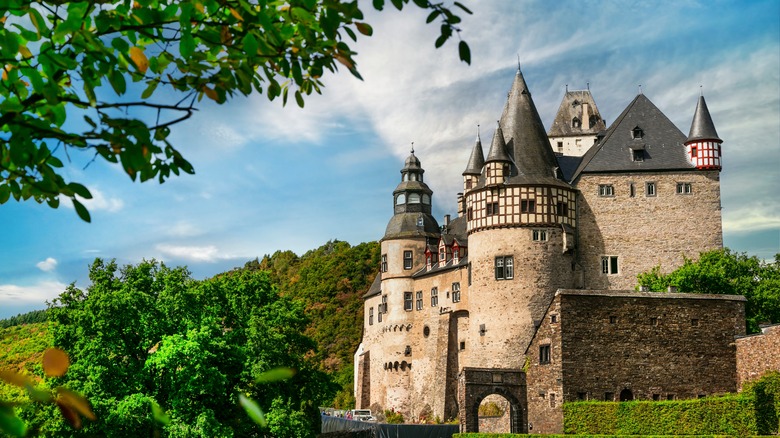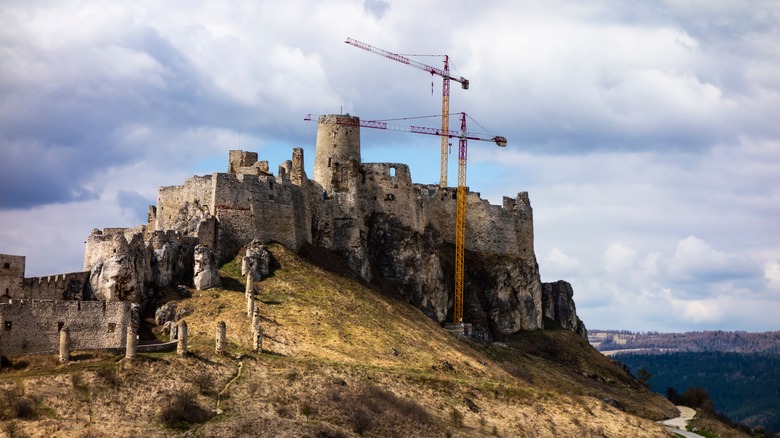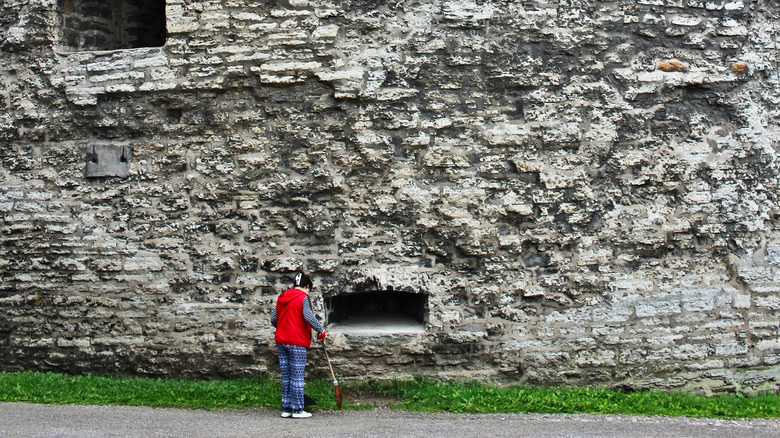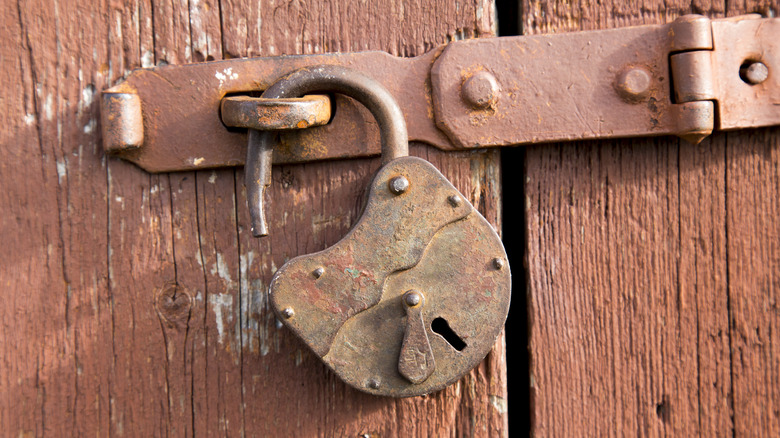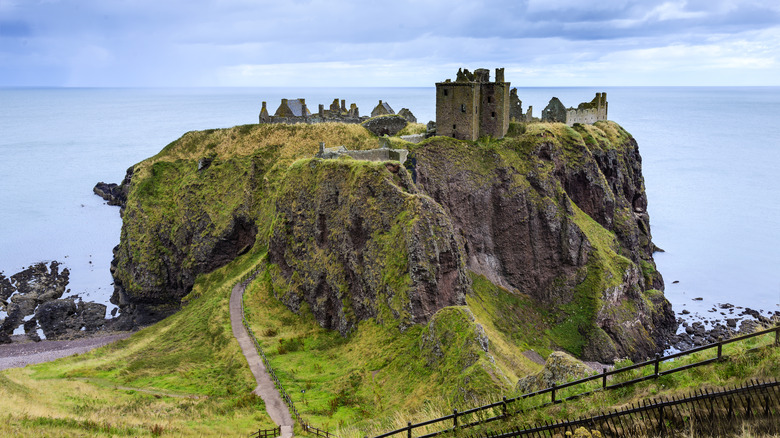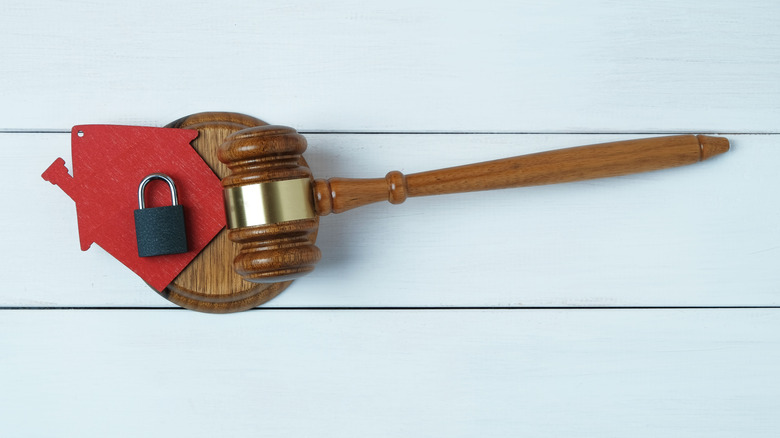Here's Why Castles Aren't The Dream Properties You'd Think They'd Be
When it comes to window shopping, designer boutiques have got nothing on real-estate websites. According to SEC filings, Zillow has averaged more than 200 million monthly active users since late 2020, yet only 6.5 million homes were sold in the United States during this period. Fantasizing about dream homes is significantly more common than owning one, but that doesn't stop us. For some people, the fantasy of owning a home is too run-of-the-mill — for them, only a castle will do. Helen Cassidy, an auctioneer, specializing in Irish castle sales, says that people who dream of owning a castle have "a great thirst for the purchase of the dream, and that thirst is only quenched when they buy. I deal with a very determined buyer," via Irish Mirror.
Attractive prices, a lifetime of fairytales, and beautiful photographs on real-estate websites may have you dreaming of owning a castle of your own one day. However, France Today reports that many castles are available at bargain basement prices because of sky-high renovation costs and the ongoing maintenance needed to keep a castle going. This doesn't stop people from being seduced by the allure of living in such evocative historic properties. If you dream of life as a castellan, here are some of the most significant, real-life pitfalls you should factor in the next time you fantasize about finding your family fortress.
Investment on a historical timescale
For most people, home ownership will be their most significant investment decision. While it is true that extant castles have stood the test of time and some well-restored and habitable castles fetch eye-watering prices on the open market, these are an investment for the long term. Although castle-buying enthusiasts tend to be committed to the cause, there aren't that many people looking for a château to buy, so castle owners often face a long hunt to find a prospective buyer, according to CurrencyFair.
However, per James Mackenzie, head of Strutt & Parker's UK Country House Department, these one-of-a-kind properties "will suit a particular buyer and niche audience that can naturally take longer to come to the fore than buyers for more traditional four-bed family homes. But, when the right buyer falls in love with the house, the sale can move extremely quickly," via Christie's International Real Estate. People looking to make a quick buck from castles have been burned before, according to Baron Christoph Freiherr von Schenck zu Schweinsberg, head of Castles & Manor Houses for Engel & Völkers (via Bloomberg). After the fall of the Berlin Wall, investors hungrily bought up castles in Poland, thinking their value would skyrocket. "Now people who bought these castles for ridiculous prices are selling for half [what they paid]."
Upkeep, repairs, and maintenance costs
Buying a castle is just the beginning of the financial journey that owners embark upon. Each property is unique and will present its expenses and challenges to restore and maintain, but even without extensive renovations, assume monthly costs of $5,000 to $10,000 at a minimum, per Finder. Castles are not the kinds of properties that you can hope to spruce up with a bit of DIY, either. According to Mansion Global, Lord Dalhousie, who put his family estate up for sale in 2021, likens castle ownership to owning a yacht — "There are always things that need doing and it is quite hard without a large crew." Their staff levels have decreased over recent decades, but it still costs an estimated $344,000 per year to run the 350-year-old, 36,000-square feet castle when maintenance costs and other expenses are accounted for.
These ongoing costs are so significant that Cabinet Le Nail, a French luxury realtor, estimated that 90% of chateaux in France aren't adequately maintained because their owners cannot afford it (via The Boston Globe). Be under no illusions; the cost of living in a castle is not as small as the price tag on a real-estate site. The running costs of castles have ruined more than one wealthy family's dreams, do your due diligence to make sure they don't break yours too.
Making yourself a target for thieves
Castles are designed to project strength and power. They are imposing architectural expressions of might, usually built by or awarded to military leaders and heroes to garrison soldiers. More importantly, castles were built to withstand attacks from outside their walls. Nowadays, castles are just obvious and imposing. However, very few modern castle owners maintain a garrison of security forces, and castle defenses are often the first to fall into disrepair now that the risk of invading armies is less of a concern. This issue is that it makes castles an inviting target for criminals. Burglars can be enticed by the prospect of valuable artifacts and materials within and encouraged by the isolation and general lack of security.
In 2012, two English castles suffered well-publicized robberies: Yorkshire's Hemsley Castle's exterior was stripped of valuable lead, via The Northern Echo; and Norfolk Castle was robbed twice in one week, losing items belonging to Lord Nelson, one of Britain's greatest naval heroes (per Eastern Daily Press). More recently, break-in artists exploited COVID lockdowns to gain access to Arundel Castle and make off with $1.4 million of loot with tremendous historical value, reports Times of India. Don't assume that buying a castle makes you more secure — to some people, it makes you more of a target.
Remote Locations
Some of the old cliches exist for a reason, and 'location, location, location' is one such phrase. It's the number one rule in real estate, and it applies to castles as readily as it does to studio apartments in Manhattan. Castles in desirable locations, such as those with easy access to cities and transport links, are more expensive than those in less desirable, more remote locations. According to Overseas Property Alert, the best deals are found where owners and local governments cannot maintain castles scattered across the countryside. These are the source of headline-grabbing offers such as castles or villages for sale at prices as low as €1— with the caveat that new owners are obligated to invest significantly in renovations and repairs.
A lifetime of city-dwelling conveniences often leads new castle owners to overlook some potential pitfalls of remote castles. Sometimes this is as simple as a lack of amenities and long travel times, leading to family members not wanting to spend much time there. In other cases, the issues caused by remoteness can cause significant financial and logistical headaches. James Mott, founder of ProjectBook, a U.K.-based renovating consultancy, told The Wall Street Journal, "I've seen cases where miles of roads must be built before even thinking about starting work on the castle," and more frequent headaches include linking plumbing, electricity, and telephone lines to these properties from bygone eras.
Planning and Legal Issues
Let's say you have millions in cash to pay for everything we've discussed. You've even thought through security and planned how to make lemonade from the lemons given to you by the castle's quirks. Congratulations! You have figured out how to thread one of life's most difficult needles! Now the lawyers and tax collectors will pick it all apart slowly. Firstly, the tax implications of castle ownership can vary wildly, making it challenging to stick to the kind of long-term financial plans crucial to viable castle ownership. Some governments use taxes to incentivize people to invest in old buildings. However, they can quickly reverse course when times get tough, as the Italian government did in 2011 when they increased property taxes on historical buildings over 30 times previous levels, according to The Fiscal Times.
Renovations and repairs are often called for to use any building as a dwelling or business. This is especially true in the case of historical buildings that may have been neglected for extended periods. However, castles are often legally protected properties. Depending on the jurisdiction under which your castle falls, restrictions on what kinds of renovations are legally permitted can thwart your plans before they begin. Per Gawker, these limiting laws can even stop families from installing indoor plumbing in their homes, making the headaches caused by planning permission the worst aspect of castle ownership.
